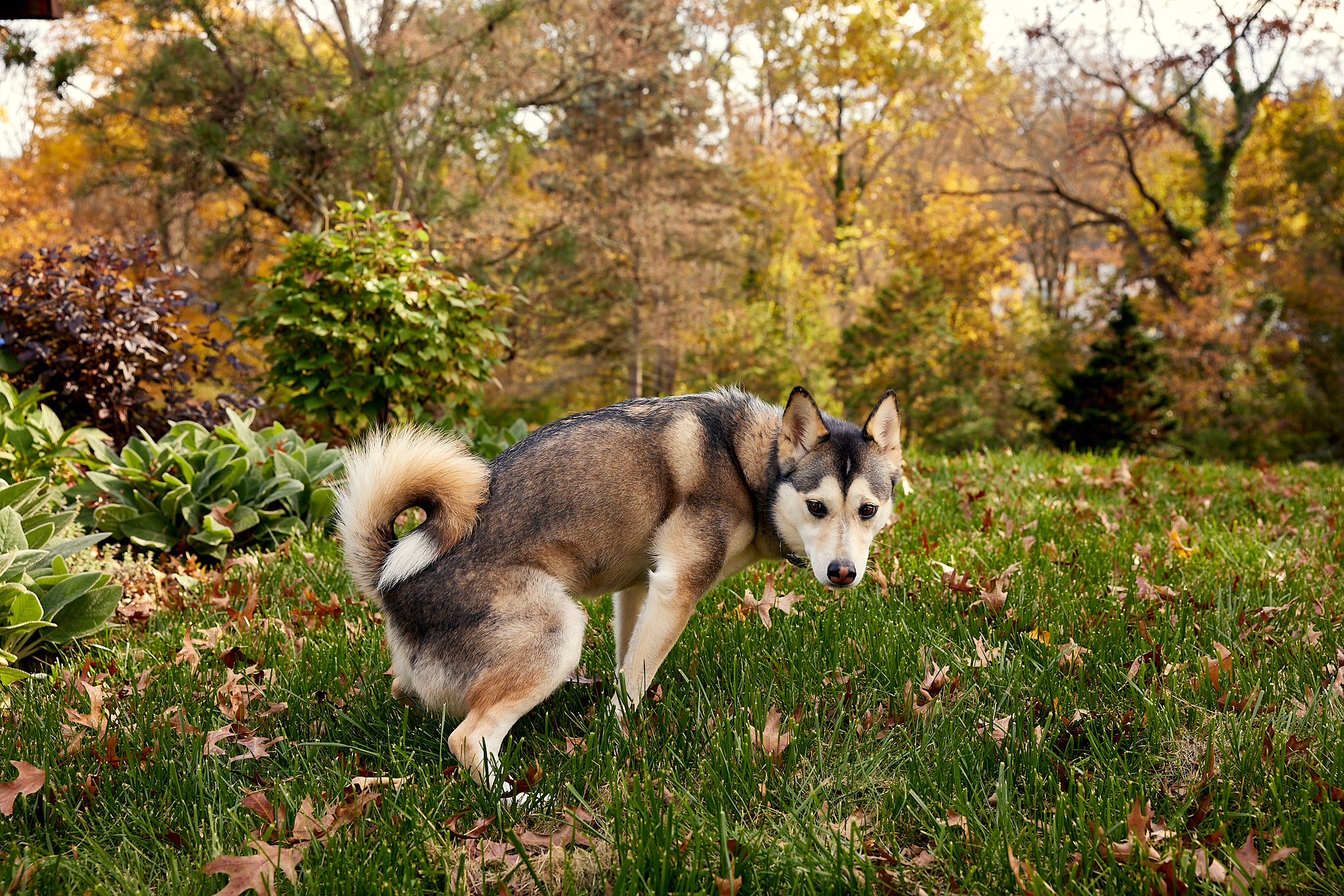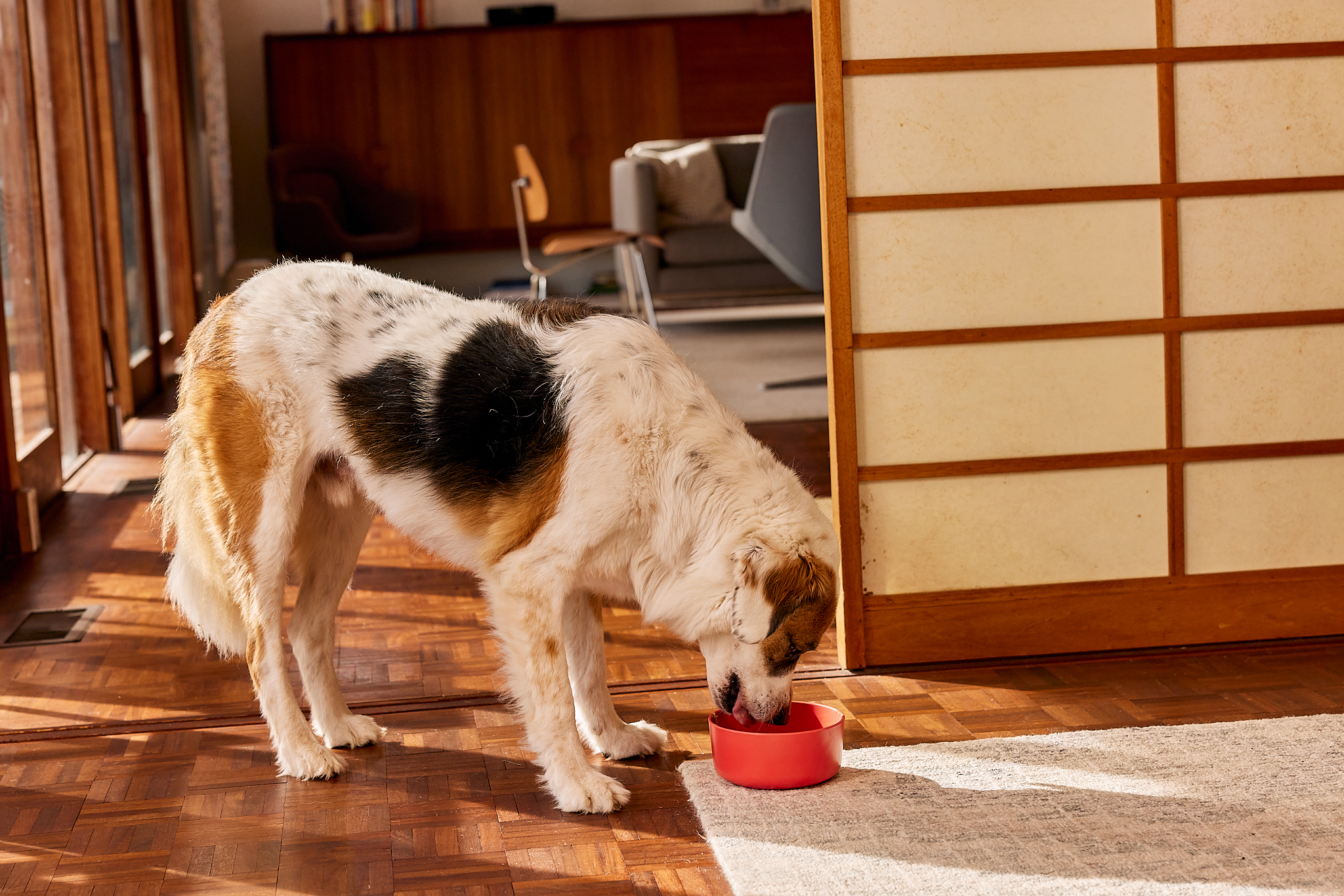Hey Ollie blog readers! We’re offering you an exclusive 60% OFF your starter box! Try now!
Dogs throw up and usually in the worst places – like hello, do you really need to throw up on the bed, carpet or couch?. Why does this happen and is it something you as a pet parent should be concerned about?
Anyone who has owned a dog (or multiple dogs) for a long time will tell you that sometimes vomiting just… happens. Your dog might throw up and then go on with their day like it never happened. How do you know if this is the case or if something more serious is going on? These tips will help you know when it’s no big deal and when to seek medical attention.
What is the difference between vomiting and regurgitation?
The Animal Medical Center of Marquette in Michigan explains that there is a difference between vomiting and regurgitation. They explain that: “Vomiting has many causes, but results in the stomach ejecting its contents through the mouth. Very active vomiting can also cause intestinal fluid to be brought up. When vomiting, a dog will often precede the act by retching, actively using the abdominal muscles, to force the contents up and out of the body. The process is often strenuous and dynamic.”
This is different from regurgitation which comes from problems with the esophagus. A dog that is regurgitating will just burp up material. There is no active movement from the abdominal muscles pressing on the stomach. When a dog regurgitates, the food is not digested as it had not yet made it’s way to their stomach.
Why might my dog vomit?
There are many reasons why your dog might be vomiting. These include:
- Stress or anxiety
Just like when you’re stressed, stress can cause vomiting in your dog. Think about the last time you were really stressed or nervous. Did your stomach hurt? Your pup could be feeling the same way. If you’ve just rescued a dog, the first few weeks you could see some vomiting as your pet gets used to the new environment. Just be patient and make sure to keep your vet and trainer in the loop as to what you’re seeing in your pup. Also, it may be helpful to familiarize yourself with these common pup stressors, so you can better avoid or stop whatever may be triggering your dog’s anxiety.
- Physical activity after eating or drinking too much water
If your dog is into running with you or you’re taking a training class where you’re using food as a reward, you might want to watch how much you allow them to have right before or during activity. If a dog eats or drinks too much water they’re active this could lead to vomiting. If this is the case you’ll likely see undigested food in the vomit – what went down comes right back up!
- Viral infections
Like us, dogs can get a stomach bug. Most of these bugs run their courses in 24 -48 hours but there are some that might require medical treatment. If your dog is vomiting, seems lethargic or is running a fever. Give your vet a call and they’ll let you know if you need to bring your pet in for treatment.
- Ingesting something poisonous or toxic
If your dog is vomiting, make sure to retrace your steps. What has your dog eaten recently? If they’ve gotten ahold of something they shouldn’t have eaten, that could be the cause of the vomiting. Common items that your dog may have eaten include chocolate, onions, garlic, plants or even big pieces of a toy. Try to identify what your dog may have eaten and give your vet a call. Toys can cause blockages that require surgery to remove.
When should I be concerned about my dog vomiting?
1. Your dog is acting strangely after vomiting
If your dog seems disoriented, weak, has a fever or is having trouble walking combined with vomiting, this could be a sign of a more serious illness. Get your dog to the vet as quickly as you can and let your provider know what other symptoms you’re seeing in your dog. This will help your vet know what tests to order to make a diagnosis.
2. You find blood in your dog’s vomit
If you see blood in your dog’s vomit, this is definitely a cause for concern. Call your vet and make sure your dog is seen as soon as possible.
3. Your dog won’t stop vomiting
If your dog is vomiting continuously, you will want to seek medical treatment. You also want to watch to see if your dog is continuing to vomit with nothing coming up. This information will help your vet figure out what is going on.
What can you do at home to stop your dog from vomiting
It can be hard to tell if vomiting is no big deal or if your pet needs medical attention. “Some dogs puke if they don’t eat on a regular schedule and you’ll get that yellow bile type vomit. Sometimes even just being on an antacid can help with that.” Said Dr. Katie Swales a veterinarian at Rainbow Vet in Darlington, PA.
She also advises that “Chronic pukers, in a perfect world, would go for an ultrasound and/or an endoscopy. If you have a dog that is NOT a chronic puker that suddenly can’t hold anything down, she always recommends that pet parents get that checked out.”
“Dogs can absolutely get gastroenteritis like we can and have a bad day or two, but some dogs get completely obstructed with a rock or a sock and you’d barely know. I’m a “better safe than sorry” person.” She says. Dr. Swales recounts a case where she had a dog brought in for just not being himself and refusing just one meal. It turns out the dog had a rock wedged in his small intestines. In this case, better safe than sorry certainly paid off. Some dogs are great at hiding illness, she likes to remind pet parents.
If your dog has vomited recently here are a few tips to support them as their stomachs recover. Remember that if you think something more serious is going on, contact your vet before trying any of the tips below.
- Wait before feeding them again
Even if your pup is acting hungry – give them some time for their stomach to settle. You can even wait to give them a drink to help make sure it doesn’t come right back up. Just don’t wait too long as vomiting can cause some dehydration. If you have concerns, work with your vet to form a plan. Try to keep your pet calm and at a comfortable temperature so you don’t exacerbate the dehydration.
- Try a temporary bland diet
You can offer some lean hamburger meat or boiled chicken and rice. Pumpkin can also help settle your dog’s stomach. Ollie’s Turkey recipe uses a generous dose of pumpkin to make it easy to digest for pup’s with sensitive bellies. If you’re feeding canned pumpkin, you need to use plain pumpkin puree and not pumpkin pie filling. The latter can contain spices and sweeteners that are not good for dogs. If you’re on the go consider keeping one of these pouches of pumpkin puree in your travel bag.
- Change your pet’s food
If you think your pet is throwing up because of a sensitive stomach, consult your vet or a nutritionist about other food options that will be less irritating on your dog’s stomach. If you plan to make a change, you will need to do so gradually over the course of at least 7-10 days to make sure you’re not further irritating your pet’s stomach.
- Try a “puzzle feeder” or slow feeder
If your dog is throwing up because they are eating too quickly try a slow feeder to help them slow down. Slow feeders are designed to keep your pet from gobbling their food too quickly. They might have some columns or channels that the food will settle around so that your pet has to eat around the obstacles. These puzzle feeders from Outward Hound are a popular choice.
The Ollie blog is devoted to helping pet parents lead healthier lives with their pups. If you want to learn more about our fresh, human-grade food, check out MyOllie.com.
Tagged As:

The nutrition your dog needs,
the food they want.

Enjoying our articles? Subscribe our Newsletters and get new articles directly to your inbox
You might also like
3 July 2025
5 MINS READ
How Fresh Food Can Help Your Dog Have Perfect Poops
As a pup parent, you’re likely very familiar with your dog’s bathroom habits. While it may not be the most glamorous part of taking care of your pup, a dog’s stool can be one of the most dir…
by Ollie Pets
4 June 2025
5 MINS READ
How Can Fresh Dog Food Help with Weight Management?
Maintaining a healthy weight is one of the most important aspects of your dog’s overall health and longevity. Being overweight or underweight can result in health complications and conditions that…
23 May 2025
5 MINS READ
Why Fresh Dog Food Makes Happier, Healthier Dogs That Live Longer
Every pup parent wants their dog to live a long, happy life, and the path to a healthier, happier dog starts with what’s in their bowl. Recent research and expert insights reveal that fresh dog …
by Ollie Pets







